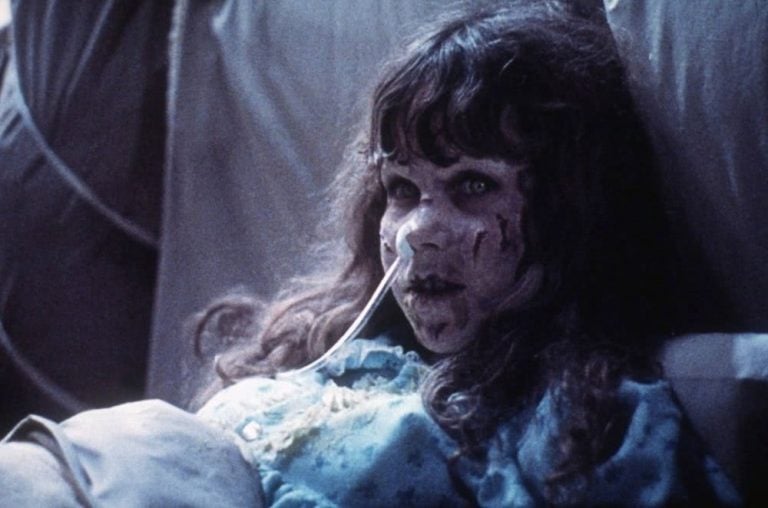The Exorcist came into my life like a thunderclap. It was somewhere around midnight, late October, 1996, and I had been off sick from school all day with the flu. I had spent the day in bed, fighting off waves of nausea and headaches, but come midnight, I was starting to feel better – finally, my body didn’t feel like it was on fire anymore, and, after spending so much of the day under sheets, I decided the last thing I wanted to do was sleep.
I went upstairs. We had a tiny television up there – one of those portable, bulky plastic things, antennae sprouting of it like rabbit ears. I was a nerdy, anxious little six-year-old; prone to tears; quick to assume my parents had abandoned me if they were even five minutes late to pick me up from school; wracked by almost nightly bad dreams about falling onto the tracks and getting crushed by the London underground trains my father and I caught to my drama lessons every weekend.
So being awake past midnight – breaking the rules my parents had about bedtime – was maybe the most rebellious thing I had ever done. I was transgressing, and I knew it; a weird mix of hot shame and pleasure shot through me, and set me alight. I turned on the television.
I didn’t immediately know that I was watching a horror movie. The prologue of The Exorcist doesn’t really feel like one, after all – it’s strange, sure, and it’s eerie, but nothing outwardly horrific actually happens. A clock stops; Father Merrin (Max von Sydow) almost gets struck and killed crossing the street; and the statue of Pazuzu, silhouetted by the Iraqi sun, rears up like a wounded predator.
The Exorcist is my shorthand answer when people ask me what my favourite film of all time is – but it is more than that too.
It wasn’t until some time later that I realised what I was really watching – not until the candle in the hand of Chris MacNeil (Ellen Burstyn) coughed up a fireball; not until poor, tormented Regan (Linda Blair) told an astronaut that he was to die in space, and promptly pissed all over the floor. And by then, I couldn’t stop watching. I wanted to – I was more afraid than I had ever been in my life; convinced that the evil I was watching onscreen was some kind of karmic punishment for breaking the iron cast rule of bedtime – but I couldn’t move.
It was gone two am by the time the noble Father Karras (Jason Miller) had taken the devil inside him, sparing Regan, and hurled himself out the window, to his death. And then the film was finished. I was freed from the little television set. I turned it off, padded down the stairs, got into bed, and cried until the sun rose. I felt like part of me had been broken.
I wouldn’t watch The Exorcist for another five years, but I thought about it almost every night. I found that mulling over certain scenes generated an almost immediate physical response in me; I’d call to mind the image of Regan’s stomach covered in scar tissue graffiti, or Burke Dennings’ (Jack MacGowran) voice emanating out of the young girls’ chapped, bloodied mouth, and my skin would go cold; my heart would start pounding in my chest.
When I did return to the film, I did so with all the bravado of a fairgoer traipsing through a haunted house a second time around, becalmed by the fact that they know exactly when all of the monsters will lurch out of the gloom. But that false sense of security was shattered the moment The Exorcist began. The prologue, which had previously been the most innocuous section in the film for me, was suddenly the most traumatic, confronting thing I had ever seen. It made my hands ball into fists; bitter spit collect in my mouth.
Nothing is replicated each time I watch The Exorcist; nothing is repeated.
I have seen The Exorcist literally hundreds of times since then. I know it back to front. It is my shorthand answer when people ask me what my favourite film of all time is – but it is more than that too. It has shaped my life. It is the reason I am both a film critic, and an undergrad student of religious studies; the reason I have dedicated hours and hours to Christian theology, and moral philosophy, and horror films. It is the work of art that reflects my inner world better than any other.
But it is also never the same thing twice for me. Just as the prologue alternates between feeling like the calm before the storm and the storm itself, so too is the film this constantly shifting, chameleon-like entity. Film critic and lover of genre film Mark Kermode once said The Exorcist “gives out what you bring to it”, and he’s right: I have alternatively read The Exorcist as a story about love; about God; about the foolhardiness of faith; about the importance of faith; about international politics; about puberty.
Nothing is replicated each time I watch The Exorcist; nothing is repeated. Well, almost nothing. There is still something about the film that I can’t explain; something about it that feels as academic as a scraped knee, or a shattered tooth. And every time I watch it, some part of me is a six-year-old boy again, curled up in a tight ball in an attic, having their life slowly and methodically changed.
The Exorcist is playing at Dendy Newtown on Tuesday October 31.

































